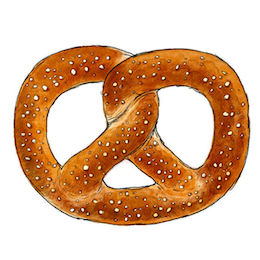Why Am I Eating This?
A few weeks ago, I was walking to a party in Manhattan. Halfway there, I stopped and bought a hot pretzel from a street vendor.
That should have been my first inkling that something was amiss.
Why? I don't like pretzels and I wasn't hungry.
For someone who has devoted half her life to understanding the reasons why people turn to food and binge eat when they're not hungry, this last teeny fact--lack of hunger and eating anyway--is always a red flag. Usually, when I want to eat and I'm not hungry, I take some time--at least a couple of minutes--to ask myself what I am feeling. Usually, I know that no matter what's going on, it's always better to feel it than to use food to swallow it.
But that night I seemed determined to go unconscious. I pulled off a hunk of the pretzel, slathered it with mustard, and took a bite. It didn't taste good, so I took another bite just to make sure that I'd tasted it right the first time. Still gluey, still bland. I asked the next homeless person with a "Need Food" sign if he wanted the pretzel. He told me he was allergic to wheat, so I gave him a few bucks, threw out the pretzel, and continued on my way to the party.
The moment I arrived, I headed straight for the food. It wasn't exactly a binge eating paradise--sesame shrimp, polenta cakes, Swedish meatballs (none of those yummy, deep-fried, trans-fat, or insulin-hysterical foods), but I made do. Every time a tray came past, I took what was offered. Then I started following the trays around, after which I stationed myself in the kitchen and greeted the trays as they were taken from the oven. I felt like an overstuffed sausage. As I waddled from room to room, my belly preceded me.
On my way back to my hotel that night, I realized that this was my first bout of binge eating in 5 or 6 years. If my husband, Matt, had been around, he would have eyed me and said, "A coupla polenta cakes, some shrimp, and six bites of cookies hardly doth a binge make..." But then I would've had to remind him that binge eating is not defined by the amount of food you eat but by the way you eat it. Two cookies can be a binge if you eat them with urgency, desperation, and the pressing need for an altered state. Food is a drug of choice, and when you binge, you are using your preferred substance to deny, swallow, or escape your feelings.
I tell my retreat and workshop students that kindness and curiosity after binge eating are crucial. And so, the next morning, I was kind to myself.
I was curious. I wanted to know what was going on. Why food had suddenly seemed like my only salvation.
And here's what I discovered:
I was tired. I was feeling raw and vulnerable from having spent the day with a dying friend. I wanted to be alone, but I didn't feel like I had a choice about going to the party, because I'd already agreed to meet a friend there.
I made a quick decision to go, except, of course, that because I was binge eating, I didn't really show up at the party. I was preoccupied, edgy, self-absorbed, and then numb. Not your ideal companion.
Recently, a student of mine -- let's call her Rita -- had a daughter, her third child in 6 years. I met her when the baby was a year old. Rita told me she spends every night binge eating. I asked her why. She said, "I want to get my own needs met, have someone take care of me.
Sometimes I think I'm going to go crazy and throw my kids out in the rain just so they'll leave me alone. I feel so awful about myself when I think these thoughts, but then I remember that I can microwave some popcorn, pour half a cup of butter on it, and sit in front of the TV and eat. I remember I have food. That calms me down."
I asked her what would happen if she didn't eat. She said, "I'd end up feeling awful about myself for having these feelings about my kids." I said, "Seems like you end up feeling awful about yourself anyway."
"Yeah," she said. "But at least it's for eating and not for being a terrible mother."
"Who says you're a terrible mother for wanting to leave your kids out in the rain? Wanting to do it and doing it are different universes," I said. "What if you let yourself have the full range of your feelings without judging them or believing that having feelings means acting on them? What if when your kids went to sleep, instead of eating popcorn, you sat on the couch with a blanket and just stared into space? Did nothing for a while? Gave yourself some kindness that didn't also hurt you at the same time?"
That was three months ago. She's had a few binges since then, but she's also had evenings of letting herself be exhausted without eating, temporarily hating her kids without having to hurt herself (or them) for it. She's realized that when she wants to turn to binge eating, it's a sign she needs to slow down, take some time for herself -- even if it's only three minutes -- and pay attention to what's actually going on.
Wanting to binge means: Stop, slow down, be curious about why food seems to be the answer to everything. Wanting to binge is a way to get your own attention. When you want to binge, it's as if you were jumping up and down with a banner that says, "I need you to notice me now!"
So go ahead. Notice yourself. Be kind. Be tender. Be curious. You'll be surprised at what happens.
The next time you want to succumb to binge eating, tell yourself that you're going to take three minutes -- only three -- to be with yourself before you eat. Then, sit down, breathe a few times, and with as much kindness as you can muster, ask yourself gently what is going on. What do you need? Whom do you need it from? What would be the kindest thing you could do for yourself now?
If you still want to eat after you've done this, notice how the food tastes in your mouth. Notice how you feel after you've eaten. Ask yourself if eating felt kind.








